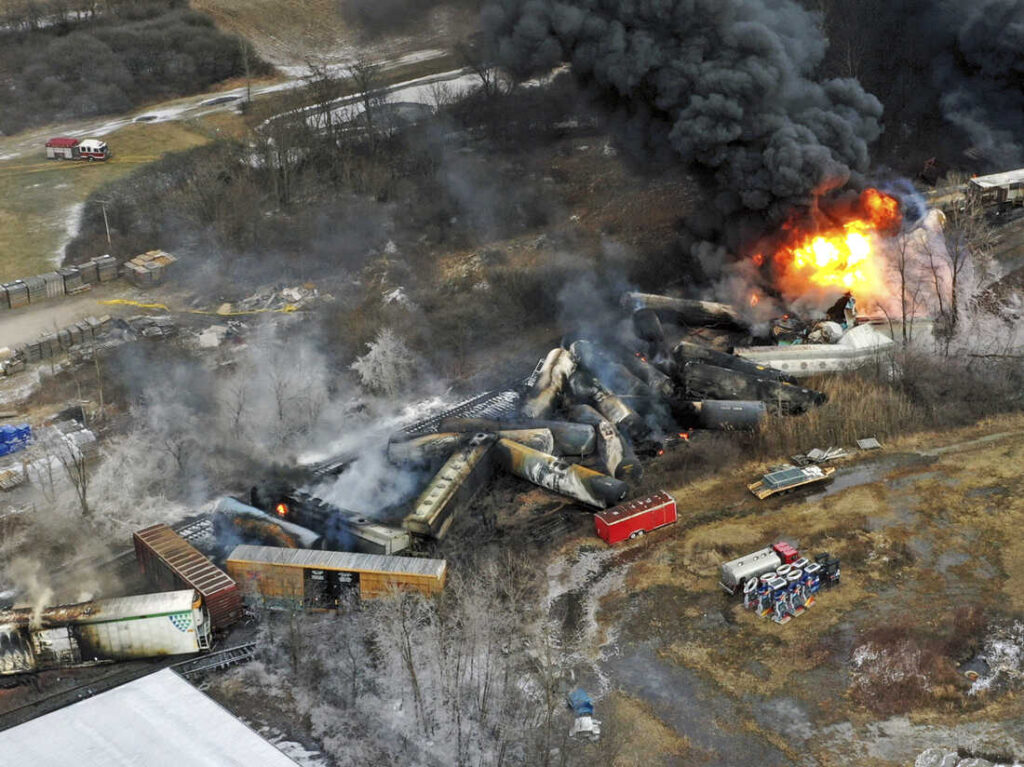Norfolk Southern plans to pay residents and businesses $600 million to settle a class-action lawsuit over a February 2023 train derailment in East Palestine, Ohio.
Still pending court approval, the settlement does not contain any admission of liability or wrongdoing from the rail company.
The agreement would resolve class action complaints within 20 miles from the site of derailment, and personal injury claims within 10 miles.
Thousands of residents were forced to evacuate from the East Palestine area after the derailment, which preliminary reports suggested was caused by a faulty wheel bearing on one of the train’s freight cars.
Settlement payment recipients would be able to use the money as they see fit. But some residents worry that the settlement money would be minimal when divided among all claimants, according to the Associated Press.
Norfolk Southern made national headlines last year after approximately 50 of its freight cars derailed while containing toxic chemicals like vinyl chloride. Used in many plastic products, this chemical is carcinogenic and fatal to many animal species.
After the derailment, rail workers set chemicals in the freight cars on fire to prevent their spill. But the National Transportation Safety Board later deemed these burns — which set tens of thousands of gallons of hazardous materials ablaze — unnecessary.
The derailment and subsequent burning prompted an outpouring of environmental and health concerns from local residents.
Attorneys representing Norfolk Southern told the Associated Press that the settlement funds aim to offer residents and businesses relief after the derailment and subsequent year of investigation.
To date, Norfolk Southern has spent more than $1.1 billion responding to the incident, which the United States Environmental Protection Agency said did not constitute a public health emergency last week.
Environmental and health concerns associated with the derailment extended to West Virginia, with the state border located less than 20 miles away from the incident.
Concerns stemmed from the derailment’s proximity to the Ohio River, a waterway that forms West Virginia’s western border and directly touches 12 different counties.
Gov. Jim Justice said in February 2023 that state officials had not detected a dangerous concentration of chemicals in the state’s drinking water following the derailment.
Scott Mandirola, deputy secretary for the West Virginia Department of Environmental Protection, also said that water samples collected from the Ohio River contained low concentrations of the chemical butyl acrylate, but that they did not pose a threat to public health.
Mandirola said that air quality tests in West Virginia’s Northern Panhandle likewise did not suggest the presence of threats to public health.
Meanwhile in Washington, D.C., the derailment’s aftermath spurred promises of train safety reform and, this year, a new policy for train crews.
Last week, the Federal Railroad Administration announced all domestic trains must have a crew of at least two members. The policy was first developed under the administration of former President Barack Obama, but was pushed forward by the derailment in East Palestine.
While the new policy begins to take effect, the Norfolk Southern settlement will await a final court decision before settlement payments are initiated.
The settlement plan could be submitted for court approval as early as this month, and settlement payments could begin before the year ends, according to the Associated Press.




















